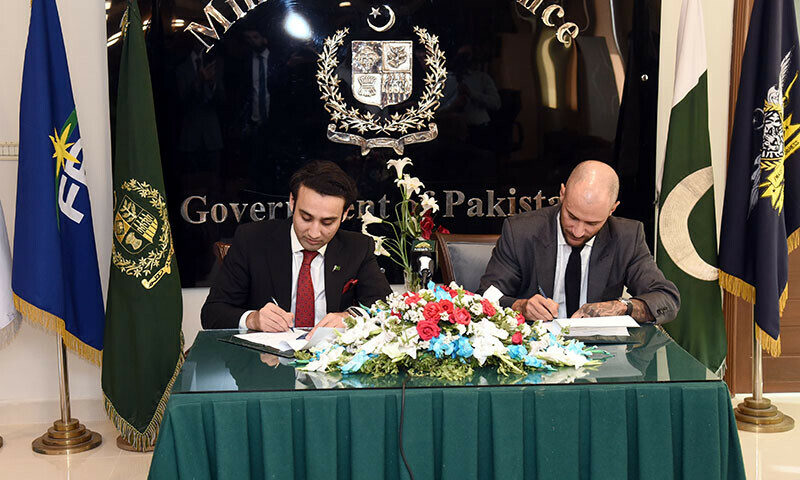The Pakistan Crypto Council (PCC) on Saturday partnered with World Liberty Financial (WLF), a decentralised finance platform backed by United States President Donald Trump, to advance cryptocurrency applications and boost blockchain adoption.
Trump and his affiliates hold a 60 per cent stake in WLF, which launched last year. The US president has promised to regulate the industry favourably and his administration has eased enforcement actions against several big industry players.
A press release from the finance ministry said a WLF delegation visited Islamabad today and signed a letter of intent with the PCC. The delegation comprised Zachary Folkman, Chase Herro and Zachary Witkoff, the son of Trump’s special envoy Steve Witkoff.
“[The] WLF … has signed a landmark Letter of Intent with the PCC to accelerate blockchain innovation, stablecoin adoption and decentralised finance integration across Pakistan,” the press release reads.
It added that the delegation met the prime minister, chief of army staff, deputy prime minister, information and defence ministers to formalise cooperation, “marking a major step toward positioning Pakistan as a global leader in the digital finance revolution”.
The statement said the government has signalled plans to announce comprehensive crypto legalisation policies soon, to bolster “Pakistan’s position as one of the fastest-growing crypto markets in the world”.
The letter was signed during a meeting between the WLF and the PCC, which was attended by Finance Minister Muhammad Aurangzeb via video link. PCC CEO Bilal Bin Saqib, the chairman of the Securities and Exchange Commission of Pakistan (SECP) and the State Bank governor were also present.
“The scope of cooperation between [the] PCC and WLF outlines collaboration in key areas including: launching regulatory sandboxes for blockchain financial product testing; facilitating the responsible growth of DeFi (decentralised finance) protocols; exploring [the] tokenisation of real-world assets like real estate and commodities; expanding stablecoin applications for remittances and trade; and providing strategic advisory on blockchain infrastructure and global regulatory trends,” the press release reads.
Aurangzeb was quoted as saying, “Pakistan’s youth and technology sector are our greatest assets. Through partnerships like this, we are opening new doors for investment, innovation and global leadership in the blockchain economy.”
Saqib, meanwhile, said the agreement was “more than just a partnership, it’s a strategic move to empower our young population and integrate Pakistan into the future of global finance”.
The statement said the WLF leadership praised Pakistan’s dynamism, stating that Pakistan’s energy, vision and talent made it one of the most exciting places in the world to build the future of decentralised finance.
The finance ministry stated that Pakistan, with 64pc of its population under the age of 30, offered one of the world’s most promising digital economies.
“The country ranks among the top in global crypto adoption, with an estimated $300 billion in annual crypto transactions and 25 million active crypto users,” the press release said.
“With rising mobile penetration, a vibrant freelance economy, and strong government interest in blockchain, Pakistan’s youth are uniquely positioned to drive the next wave of Web3 innovation.”
Last month, Saqib said that the country planned to legalise cryptocurrency to lure international investment in Pakistan.
In an interview with Bloomberg, Saqib said Pakistan aimed to create “a clear regulatory framework for governing digital-asset activities to boost the local ecosystem”.
“Pakistan is done sitting on the sidelines,” he said, adding that they wanted to attract international investment because the country was a low-cost high-growth market with 60pc of the population under 30.


